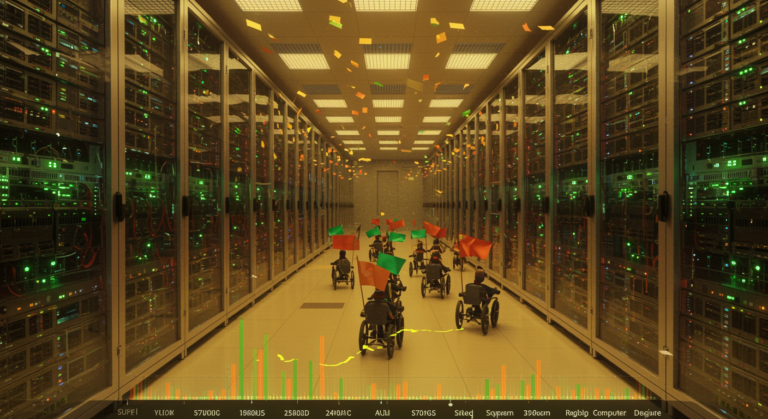
AI’s Negative Effects on News: Americans Predict Harmful Impacts
AI’s Growing Influence Raises Concerns in American Media Landscape
Have you ever wondered how AI’s impact on news might reshape the stories we rely on daily? Artificial intelligence is already changing the way news is created and shared in the U.S., but a wave of unease is building among the public. Recent studies show that many Americans fear this shift could undermine the reliability of journalism over time.
According to a Pew Research Center survey from summer 2024, about half of U.S. adults predict negative outcomes from AI’s integration into news media in the next 20 years. Specifically, 24% expect very negative impacts, while 26% anticipate somewhat negative effects. This growing concern about AI’s impact on news highlights a stark divide, with only 10% of respondents foreseeing positive changes.
The rest are split between mixed outcomes and uncertainty, painting a picture of hesitation in an era of rapid tech advancement. As AI tools become more prevalent, it’s worth asking: could this technology enhance or erode the core of trustworthy reporting?
Educational Background Influences Perceptions of AI’s Impact on News
Education plays a key role in how people view AI’s impact on news. Those with higher education levels tend to be more cautious about AI stepping into journalism’s shoes. For instance, 56% of college graduates predict it will harm news quality, compared to 44% of high school graduates.
This pattern shows up in other areas too, like confidence in AI versus human journalists for writing stories. People with some college experience are more likely to doubt AI’s abilities, suggesting that deeper learning might sharpen awareness of its limitations. It’s a reminder that AI’s impact on news isn’t just about the technology—it’s about who controls and understands it.
Broader AI Concerns Extend Beyond Journalism
AI’s impact on news is part of a larger conversation about technology’s role in society. A YouGov poll from March 2025 revealed that 40% of Americans now believe AI will negatively affect society overall, up from 34% a few months earlier. This rising worry spills into personal lives, with 28% expecting downsides for themselves.
Age Differences in AI Perception
Age adds another layer to this debate—older Americans are far more pessimistic. Data from YouGov in January 2025 shows that 48% of those 65 and older think AI will hurt society, while only 31% of younger adults agree. This gap might stem from differing experiences with tech changes over the years. For younger generations, who grew up with digital tools, AI’s impact on news could feel less threatening than it does to their elders.
Specific Concerns About AI’s Impact on News and Information
When it comes to AI’s impact on news, misinformation tops the list of worries. A January 2025 Gallup survey found that 72% of Americans expect AI to worsen the spread of false information. This fear isn’t abstract; it’s tied to real risks like deepfakes and biased content.
The Misinformation Challenge
Imagine scrolling through your feed and not knowing if what you’re reading is real— that’s the scenario many fear with AI. Among those already skeptical, 75% are very concerned about misleading videos and audio. Experts warn of a cycle where AI generates flawed content, which then trains more AI, amplifying errors. This could erode trust in news sources, making it harder to separate fact from fiction in our daily lives.
Trust Deficit in AI Decision-Making
At its core, AI’s impact on news raises questions about reliability and ethics. YouGov’s January 2025 data indicates that 58% of Americans have little faith in AI for ethical choices, and 52% doubt its ability to stay unbiased. These trust issues are critical because journalism depends on fairness and accuracy—areas where AI often falls short in public eyes.
Think about it: if we can’t trust AI to handle decisions impartially, how can it play a bigger role in reporting? This skepticism underscores the need for human oversight to keep news credible.
Comparing AI to Other Digital Technologies
It’s interesting to compare AI’s impact on news with how we view other tech innovations. While 75% of Americans see the internet as a positive force and 70% feel the same about smartphones, only 36% are optimistic about AI. This contrast, drawn from the same YouGov poll, shows why AI stands out as a source of caution.
| Technology | Positive Impact on Society | Negative Impact on Society |
|---|---|---|
| Internet | 75% | Not specified |
| Smartphones | 70% | Not specified |
| Artificial Intelligence | 36% | 28% |
So, what makes AI different? Perhaps it’s the potential for unseen errors or biases that don’t worry us as much with older tech.
Mixed Views Even Among AI Optimists
Even people who are generally positive about AI have reservations about its impact on news. Pew Research found that among those expecting societal benefits, 34% still predict positives for news quality, but 27% foresee negatives. This mixed sentiment shows that AI’s impact on news is a tough nut to crack, even for its supporters.
It’s like cheering for a new tool while worrying about how it might misfire in sensitive areas like reporting.
Quality Concerns with AI-Generated Content
Beyond trust, there’s a worry that AI-generated news lacks the depth and emotion of human writing. AI often repurposes existing info without adding fresh insights, resulting in content that feels impersonal. Google’s guidelines emphasize that AI-created material isn’t automatically favored in searches—it’s all about being helpful and original.
If AI’s impact on news means more robotic stories, readers might tune out. News organizations could counter this by blending AI’s speed with human creativity for better results.
Implications for News Organizations and Journalists
News outlets are at a crossroads with AI’s impact on news, facing a trust gap with audiences. A Bentley-Gallup report from August 2024 highlights that people don’t fully trust businesses to use AI responsibly. But there’s hope: being transparent about AI use could rebuild confidence.
Potential Solutions for Responsible AI Use in News
So, how can newsrooms move forward? Start with clear disclosures on AI involvement, ensure human editors review everything, and limit AI to tasks like data analysis. These steps could make AI’s impact on news a positive one, fostering accuracy and fairness. By adopting these practices, journalists might turn skepticism into acceptance.
The Future of AI in American Journalism
Looking ahead, AI’s impact on news will keep evolving, but challenges like regulation loom large—68% of Americans want more oversight. News organizations could thrive by addressing these issues head-on, perhaps through pilot programs that test AI ethically. As we adapt, real-world examples might shift perceptions from fear to opportunity.
One thing’s clear: balancing innovation with integrity will be key.
Conclusion
In wrapping up, AI’s impact on news reflects deeper societal tensions, with half of Americans predicting harm to journalism. From misinformation risks to quality dips, the concerns are valid and widespread. What are your thoughts on this—do you see AI as a threat or a tool for better reporting?
If you’re interested in staying informed, check out our other articles on tech trends. We’d love to hear your experiences in the comments below—share this post and join the conversation on how we can navigate AI’s future responsibly.
References
1. Pew Research Center. “Americans largely foresee AI having negative effects on news, journalists.” Link
2. YouGov. “Americans increasingly skeptical about AI, artificial intelligence effects: Poll.” Link
3. Pew Research Center. “What the data says about Americans’ views of artificial intelligence.” Link
4. Gallup. “Americans express real concerns about artificial intelligence.” Link
5. Gallup. “Americans using everyday products without realizing.” Link
6. WebFX. “Dangers of AI content.” Link
7. YouGov. “Do Americans think AI will have positive or negative impact on society?” Link
8. Google. “Google Search and AI content.” Link
AI’s impact on news, AI and news, artificial intelligence journalism, AI misinformation, Americans AI skepticism, AI news content, AI negative impact, AI in journalism, news quality and AI, public perception of AI




